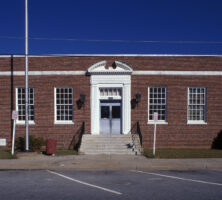Baxley, the seat of Appling County, is located in the wiregrass region of southeastern Georgia.
Most of the town’s early economic development stemmed from the timber rafting and naval stores industries that dominated southeast Georgia during the late nineteenth and early twentieth centuries. According to the 2020 U.S. census, the population of Baxley is 4,942.
Baxley was named for Wilson Baxley, a North Carolinian who arrived in Appling County during the 1820s. He operated a log store and sold cattle and timber to markets in Savannah and Darien. Baxley sold the right of way near his store to the Macon and Brunswick Railroad, completed in 1870, which designated the area Station Number 7. Baxley’s proximity to the railway prompted voters to relocate the county seat from Holmesville to Baxley. The Georgia legislature officially granted incorporation in 1875.
The new designation did not automatically induce settlement. The 1900 census recorded only 700 town residents. Most Georgians considered Baxley part of the less arable pine barrens region. It lay upon a strip of low pond land, and recovery from the Civil War (1861-65) also impeded growth. But residents eagerly sought opportunities to support economic development. Most inhabitants operated small subsistence farms in the surrounding countryside, which produced such staples as corn, wheat, sugar cane, and livestock. Cotton became a major economic factor between 1880 and the 1920s, until the boll weevil, foreign competition, and synthetic production of fabrics hurt cultivation. A revival of the crop took place during the 1980s.
Residents turned the vast number of pine trees to their advantage. They tied cut logs into broad, flat-bottomed rafts 25 feet wide and 175 feet long and poled the crafts down the Altamaha River to sawmills at Darien. Baxley profited from Appling County’s role as a center of turpentine and resin production until tobacco farming gained favor during the late 1920s. The sale of sweet potato plants from 1917 to the early 1930s brought national attention to the town. In 1933 the local Kiwanis Club celebrated “Sweet Potato Plant Day,” sent more than a million plants for the destitute of Atlanta during the Great Depression, and invited Governor Eugene Talmadge to speak in honor of the occasion.
Early residents also worked to bring a cosmopolitan atmosphere to the area. Before the 1950s Baxley hosted a debating club, balls, dances, musicals, lectures, and a state class D baseball team, the Baxley Red Sox. Townspeople took advantage of the growing popularity of automobile travel by building tourist homes and motor courts during the 1920s and 1930s. Several newspapers started production, but only the Baxley News Banner has continued in operation under various names since 1884.
Baxley’s current economic activity relies more heavily on industry. During the late 1960s the Edwin I. Hatch Nuclear Power Plant was built on the Altamaha River. In 2000 Appling, Jeff Davis, and Bacon counties opened the Tri-County Industrial Park on the outskirts of Baxley to attract business.
Several prominent individuals have claimed an association with Baxley. Claude Poindexter, founder of Coastal Life Insurance Company, and his brother, Edd, originally operated a combination of retail furniture and funeral business efforts during the 1930s. The two men expanded their funerary activities to establish the State Mutual Burial Association, chartered in September 1930, to offer funerals paid on an installment basis. When successfully challenged by the State Funeral Directors Associations on the grounds that the enterprise violated Georgia insurance laws, the Poindexters initiated the Coastal Life Assurance Society in 1939. It eventually became the Coastal States Life Insurance Company, which relocated to Atlanta in 1945. Alfred Jenkins, a Baxley native, served as director of Asian community affairs for the U.S. State Department during U.S. president Richard Nixon’s administration. He accompanied the president on his visit to mainland China in February 1972.

Caroline Miller, the Pulitzer Prize–winning author of Lamb in His Bosom (1933), lived in Baxley when she wrote the novel. Her work replicated the folklore, customs, and speech patterns of people living in the rural wiregrass region of south Georgia during the early 1900s. Miller frequented Barnes’s Drugstore, a popular gathering place for town locals during the early twentieth century. The building remains standing on Main Street, and its decor and soda fountain have been recreated as part of the World of Coke museum in Atlanta.
Environmentalist Janisse Ray brought new attention to Baxley with her award-winning book Ecology of a Cracker Childhood (1999). Ray’s moving account of her childhood and youth growing up poor in a junkyard owned by her father on the outskirts of the town also serves as an appreciation of south Georgia’s fast-disappearing longleaf pine ecosystem.
A satellite campus of Altamaha Technical College is located in Baxley.
Town officials and residents have recognized the historical impact of Baxley within Georgia’s nineteenth- and early-twentieth-century economic development. Baxley hosts the annual Tree Fest and Timber Harvesting Exposition, which recalls the heyday of turpentine production and rafting. The Heritage Center preserves the culture of the wiregrass region. An arts council was created in 1999 to promote holiday festivities, the annual Dirtwater Jazz and Blues Festival, art exhibits, and the Appling Community Theatre. A Main Street Renovation program marks the efforts of city officials to revitalize the economy of the town’s original business sector and focus attention upon its historic buildings. In January 2000 Baxley received the distinction as a “Better Hometown,” an award created by Georgia Power Company and the Georgia Department of Community Affairs to emphasize those areas that possess qualities for potential growth in the state.






